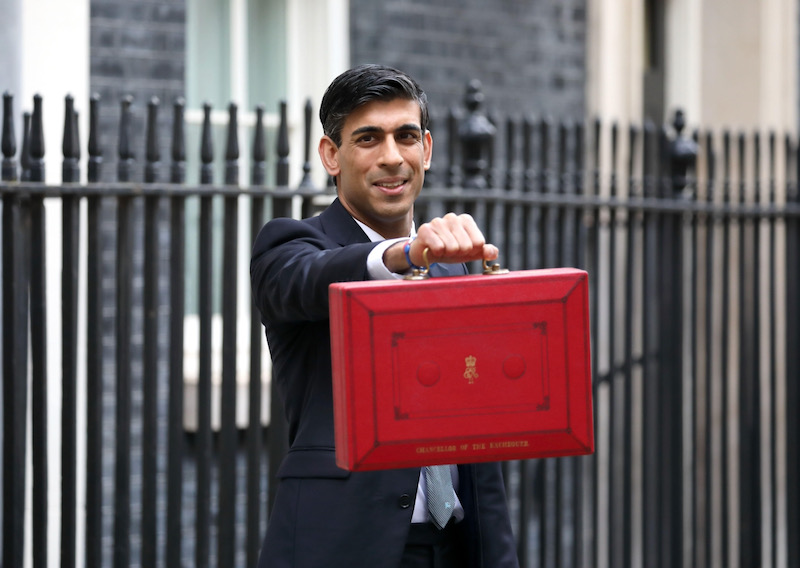Catholic charities welcomed Chancellor Rishi Sunak's decision to maintain the £20 boost to universal credit, but also regretted that this was just for six months and not permanent.
Charities are also anxious about the lack of a more comprehensive plan to help the poorest.
The Tablet was among those who argued that the £20 additional funds should not be lost from universal credit payments, with parents, in particular mothers, among those that would have been hit hardest.
Elizabeth Palmer, chief executive of the St Vincent de Paul Society of England and Wales (SVP), said the budget was one of the most important political statements of recent times and comes at a critical time for the nation.
“Last year, the UK economy shrank by 10 per cent, the worst decline in 300 years. Predictions show that around a third of the population will be living below the minimum income standard this year.”
She welcomed the extension to the Coronavirus job retention scheme as well as the decision to keep the uplift to universal credit
But she added: “Today’s Budget is a missed opportunity to set out a progressive plan which would have given millions of households and businesses a support package capable of guiding the country out of the crisis with confidence.
“The vaccine rollout has so far given us hope. This is the time for bold action to lift millions out of poverty and we are disappointed the Chancellor did not take this opportunity to deliver a compelling vision for a more levelled up and equal nation.”
The society believes the six-month extension to the temporary £20 boost to universal credit is not enough to support households as they struggle to get back on their feet and that permanent uplift should also be rolled out to people on legacy benefits.
The society is also calling for investment in re-training and skills as the job retention scheme is wound down. “The focus must now be on growth, not austerity. Overall, this is the time to increase spending rather than cutting back,” the society said.
“The temporary extension to the £20 Universal Credit uplift for only six months will undermine the road to recovery and will leave millions in limbo and at risk of falling into poverty. Cutting this lifeline in the autumn will push households into debt and will leave millions vulnerable at a time when the economic scenario is expected to be dire and unemployment is projected to be widespread. A six-month extension of the uplift also fails to meet the original objectives of the policy, which were to strengthen the safety net and protect incomes.”
Mark Wiggin, director of Caritas Salford said: “The budget is sending out a message of no hope to people who can’t manage for themselves.” He was hoping for “signs of a reimagining of the post-pandemic society” and “more kindness towards the most vulnerable”.
Wiggin had urged that the £20 per week uplift to Universal Credit and Working Tax Credit, which had been “a lifeline” for families during the pandemic, should be permanent. He told The Tablet, “the benefits system needs to keep pace with the cost of living to make sure families don’t go under and resort to loans that they will struggle to repay.” He reported that in Salford Diocese schools’ social workers and community projects are seeing an increased demand for help from families using foodbanks and voucher systems to take the pressure off their weekly cost of living, such as paying for gas and electricity. He feared that without a permanent uplift, “the government will create an even greater dependency upon the safety net of charities like Caritas and the Trussell Trust and send a message out of ‘indifference’ to people who cannot help themselves at this particularly difficult time.”
Ben Gilchrist, chief executive of Caritas Shrewsbury, said: “It’s desperately disappointing that Rishi Sunak has decided to cut Universal Credit incomes by £20 a week in six months’ time.”
He continued: “he’s ignoring the voices of hundreds of charities who know how much damage this will do to families and communities, and it means hundreds of thousands more people will be pulled into poverty just as furlough ends.” He regretted that “the Government can still choose to right this injustice and together we must speak up to call for change”.
He reported that through its schools and community work in Shrewsbury diocese, Caritas is seeing child poverty increasing, particularly as parents are being made redundant. He said: “those on the poverty line are mostly lone parents and families who were employed but not on a living wage and now many have lost their jobs so they cannot afford basic essentials like food, clothing and rent.” He reported that, “numbers are high and rising “judging by applications to our crisis fund, and this month we had an application for one family due to dad losing his job as he was stressed due to the death of a child and now the family are in serious debt and barely able to feed themselves.”
Gilchrist reported that child hunger is increasing with the lack of free school meals provision as families didn’t get the meals or vouchers promised and those that did have received poor alternatives. Also, families have not received the electronic equipment that was promised for home schooling thus affecting the children’s wellbeing even more. “School closures have hit some of our families really hard as living costs have gone up because children are at home all day and some families were faced with childcare costs which was especially difficult for those on low wages but considered key workers,” he said.
From Westminster, the chief executive of the Catholic Children’s Society, Dr Rosemary Keenan, told The Tablet that “uncertainty about income is a cause of stress and mental illness and it impacts on physical health too, especially where growing children are concerned”. In her view, “the top-up needs to be permanent, not least because rising prices are.”
Around 16 million people are in families that would feel an overnight loss of £1,040 per year, disproportionately hitting those on the lowest incomes and families with children, according to the Joseph Rowntree Foundation. Caritas members in Shrewsbury, Salford and Westminster are amongst those supporting the Foundation’s campaign “Keep the Lifeline”.
Caritas Salford has written to all the MPs with constituencies within the diocese asking them to support the campaign and gathering stories of people benefitting from the current uplift. The diocese has promoted the ‘Real Living Wage’ and other measures to reduce the widening gap between rich and poor in Britain.
National debt counselling charity Christians Against Poverty also criticised the temporary extension to the £20 universal credit and tax credits uplift.
Paula Stringer, chief executive, said: “The chancellor set out welcome measures to protect jobs and livelihoods but alone they will not protect living standards. A six month extension to the universal credit uplift is simply not enough for millions of families facing the brunt of this pandemic financially and for the millions living in poverty before this crisis.
“Those most impacted by the pandemic are those who have lost loved ones, lost jobs and borne the risks of working on the frontline for low wages. This budget brings long-term certainty for businesses, with sensible tapering of support to help them transition into the recovery, but households have not been afforded this - when furlough ends, many will need Universal Credit right at the time when it will be cut back.
“Even before the pandemic, many people on these types of benefits were struggling to make ends meet. In the coming months, many more people will find themselves out of work or relying on UC to boost their low wages. The increase is still needed despite the planned rise in the national living wage.”
“The announcements today have focussed on future investment. They have not taken away the fear and anxiety millions are facing because of their limited finances. It will not provide people living on low incomes with certainty that they will be able to keep food on the table and heat their homes in the future.”
Depaul UK said the chancellor should have gone further in order to address rough sleeping.
Mike Thiedke, chief executive, said: “I welcome the Government’s decision to extend the £20 Universal Credit uplift until September. For young people, who receive lower benefit payments, this extra £20 a week makes a huge difference. Before it was introduced, young people using our services were often unable to pay their bills and afford sufficient food. I urge the government to go further and maintain this uplift beyond September.
“I also welcome the decision to bring forward, from 2023 to June this year, improved entitlement to housing benefit for young people who are homeless or at risk of homelessness. Despite this, I am very concerned that the language used in Budget documents diverges from the original commitment in the previous Budget. By not mentioning victims of domestic abuse and human trafficking, and requiring those under the age of 25 to have stayed in a homeless hostel for a minimum of three months rather than simply having slept rough, the Government risks excluding people who need this exemption.”



 Loading ...
Loading ...